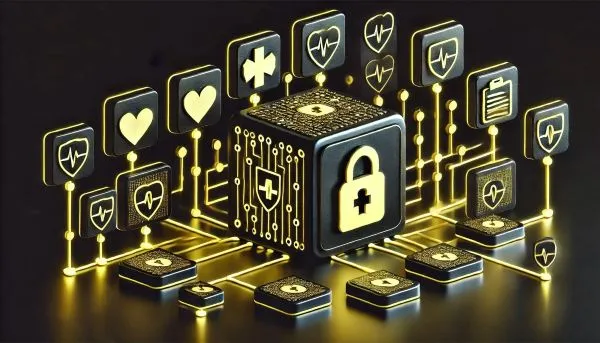What is Blockchain in Healthcare?

Blockchain technology improves healthcare data security and patient privacy by decentralizing records, ensuring data integrity, and enabling patient control over sensitive information.
Healthcare organizations can verify patient identities, medical histories, and prescriptions. Patients, in turn, retain full control over their records via pharmacy apps or patient portals, granting or revoking access as needed.
With smart contracts, blockchain reduces costs and ensures transaction validity by automating processes when specific conditions are met.
As healthcare increasingly relies on digital solutions, data security, and patient privacy have become more critical. From EHRs to telemedicine, the amount of data generated in healthcare is enormous, increasing the risks of breaches, unauthorized access, and privacy violations.
Blockchain technology is emerging as a promising way to address these challenges, offering innovative methods to protect healthcare data.
Implementing blockchain technology in healthcare
Blockchain in healthcare refers to a distributed ledger system for securely recording and storing transaction-related data.By creating a network, healthcare providers can implement a system capable of preserving and exchanging patient data through hospitals, diagnostic laboratories, pharmacy firms, and physicians.
To work effectively, blockchain relies on using advanced cryptography to let everyone in the network see and share information with one another.There is no one central storage point - instead, blockchain technology keeps copies of the records with everyone and requires individual verification to add or change any information.This mechanism makes it highly secure and allows for an audit trail of all interactions.
With regard to patient medical records specifically, blockchain has the potential to analyze, identify, and fix discrepancies or mistakes.Furthermore, because patient information can be shared easily and securely between hospitals, labs, pharmacies, and clinicians, blockchain technologies have the potential to greatly enhance effective collaboration among healthcare providers..
How Blockchain Improves Data Security
Decentralization and Data Integrity
Blockchain's decentralized nature is revolutionary for healthcare data security, where data is stored in one location, blockchain distributes data across a network of nodes. Each node has a copy of the blockchain, ensuring that no single entity controls the data, making it extremely difficult for unauthorized parties to alter or delete records.
This decentralization guarantees data integrity—once information is added to the blockchain, it becomes part of an unchangeable ledger. In healthcare, this means critical patient data like diagnoses, treatments, and medication histories are securely stored and always available without the risk of unauthorized changes. Whether a clinic adds new patient records or a specialist views a patient's history, the information remains reliable and verifiable.
You can think of blockchain as a "chain of blocks," with each block containing encrypted medical data. If someone tries to alter one block, the entire chain becomes invalid. This makes it incredibly difficult for hackers to manipulate healthcare data, as they would need to alter every node on the network—a nearly impossible task. This level of security ensures that medical records remain intact and trustworthy.
Cryptographic Security
Blockchain uses cryptography to secure data, providing an extra layer of protection for healthcare records.Cryptographic algorithms ensure that all data added to the blockchain is encrypted and only accessible to authorized parties. This is crucial in healthcare, where regulations like HIPAA demand strict safeguards for patient information.
Every time data is added to the blockchain, it is protected through cryptographic hashing, creating a unique digital fingerprint for each record or transaction. This ensures that even if the data is intercepted, it cannot be read or altered without the necessary cryptographic keys. Only authorized healthcare providers and patients with the correct keys can unlock and access the data.
A real-world example of cryptographic security in healthcare is MedRec, a blockchain platform developed at MIT.MedRec uses blockchain to securely manage medical records, employing cryptography to ensure that only authorized healthcare professionals can access sensitive data.
Real-World Applications

Several healthcare organizations are already leveraging blockchain to enhance data security. Guardtime has partnered with healthcare providers in Estonia to secure the country's entire health records system using blockchain. This system stores patient records on a decentralized blockchain, ensuring no unauthorized changes can occur while allowing patients to control access to their data.
BurstIQ, a healthcare blockchain company, focuses on securely sharing patient data between healthcare providers and patients. By using blockchain, BurstIQ encrypts health data, ensures its integrity, and allows patients to control who accesses their information. This patient-centered approach reduces the risk of data breaches and builds trust in the healthcare system.
Benefits of blockchain in healthcare
.webp)
The use of blockchain technology in healthcare could redefine the healthcare management landscape, offering the following benefits to patients and providers:
- Safeguarding patient privacy: Blockchain technology encourages autonomy and allows patients to take control of their own personal health data
- Preventing fraud: Using blockchain in healthcare can help deliver transparency and traceability in healthcare supply chain systems, cracking down on fraud by ensuring the authenticity of medical products
- Empowering patients: Giving patients control of their own health data may promote a sense of ownership and empowerment that could help strengthen the relationship between patients and providers
- Minimizing the risk of data breaches: The rise of digitalization has come with an increased risk of data breaches. However, blockchain technology addresses this issue by creating a complex network, in which data is fragmented and almost impossible to hack
- Advancing precision medicine: By securely sharing and verifying patient data, blockchain technology facilitates personalized treatment plans based on accurate and comprehensive medical records
Future of Blockchain in Healthcare
Innovations and Emerging Technologies
Blockchain is part of a broader technological revolution in healthcare. As blockchain continues to develop, it will likely integrate with other technologies like AI and IoT, creating more secure, efficient, and intelligent healthcare systems.
Combining these technologies will build a robust digital infrastructure, improving patient care and streamlining healthcare operations.
Policy and Regulatory Considerations
For blockchain to achieve widespread adoption in healthcare, governments and regulatory bodies must develop clear policies and guidelines. Policymakers should define standards for data ownership, patient control, interoperability, and cross-border data sharing.
Widespread Adoption Potential
Though blockchain is in its early stages in healthcare, its potential for widespread adoption is clear. As more healthcare organizations explore its capabilities and successful pilot projects emerge, blockchain may become the go-to solution for securing healthcare data and ensuring patient privacy.
Conclusion
Blockchain offers a powerful solution to pressing healthcare challenges like data security, patient privacy, and trust. By decentralizing the storage and management of healthcare data, blockchain empowers patients, enhances security, and improves efficiency in healthcare systems.
While challenges like scalability, interoperability, and implementation costs remain, the future of blockchain in healthcare is promising. As technology evolves and policies catch up, blockchain will likely become a foundational element in healthcare's digital transformation.
Blockchain's ability to protect patient data, ensure data integrity, and give patients control over their records is set to revolutionize healthcare, creating a more secure and patient-focused future.
FAQ
1. How does blockchain ensure the security of electronic health records (EHRs)?
Blockchain uses encryption and decentralized storage, which prevents a single point of failure. Data cannot be altered once recorded, and every access is logged—ensuring both security and traceability of patient information.
2. Can blockchain help reduce healthcare fraud and billing errors?
Yes. By using smart contracts and transparent recordkeeping, blockchain can automate insurance verification and billing, reducing manual errors and making fraudulent activity easier to detect.
3. What are the main challenges of implementing blockchain in healthcare systems?
Key challenges include integration with existing legacy systems, ensuring compliance with data privacy laws like HIPAA and GDPR, scalability for large volumes of data, and lack of standardized protocols across providers.
